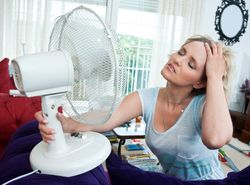
Perspiring is a natural process the body uses to cool itself; however, some people sweat more than others. Those who sweat excessively are usually diagnosed with hyperhidrosis. Here, learn more about the condition and what dermatologists recommend to manage it.
What Do I Need to Know About Hyperhidrosis?
Causes
Primary focal hyperhidrosis, or excessive sweating in the underarms, feet, hands, neck, groin, head, or face, may be due to slight nervous system malfunctions; however, more research is needed. It often affects otherwise healthy individuals, though it can have medical causes, such as sweating excessively due to a systemic disease involving the endocrine or neurological systems.
Low blood sugar, diabetes, infections, and hyperthyroidism, or having an overactive thyroid, have been linked to excessive perspiration as well. It can also be a temporary issue because of menopausal hot flashes.
 Those who have primary focal hyperhidrosis do not experience health issues from the condition but can feel frustrated or embarrassed due to sweating at inopportune times, such as when driving and trying to hold the steering wheel correctly. Additionally, stress and nervous feelings typically trigger overactive sweat glands to produce more perspiration.
Those who have primary focal hyperhidrosis do not experience health issues from the condition but can feel frustrated or embarrassed due to sweating at inopportune times, such as when driving and trying to hold the steering wheel correctly. Additionally, stress and nervous feelings typically trigger overactive sweat glands to produce more perspiration.
Diagnoses
Dermatologists evaluate excessive sweating in clients with physical exams and questioning. They may also perform blood and urine tests to see if the issue is due to an undiagnosed medical condition such as hyperthyroidism. Other tests include sweat tests that determine where the body sweats the most, and involve coating a section of skin with a special powder that turns purple when the individual starts perspiring.
Treatments
Condition management depends on the hyperhidrosis’s severity and often includes using clinical-strength antiperspirants and prescription creams. Nerve-blocking medications that interfere with nerve communications may also be used to prevent excessive sweating.
Additional treatments include Botox® injections. The substance blocks nerves that trigger sweating and the results last up to 12 months before more injections are necessary. Astringent applications, daily bathing, and wearing breathable clothing and socks also help combat hyperhidrosis.
Severe perspiration can call for more intensive treatments, such as microwave therapy that destroys sweat glands, as well as sweat gland removal. Nerve surgery provides another remedy; however, dermatologists do not suggest it for neck and head sweating.
Discuss your hyperhidrosis symptoms with the dermatologist at Heibel Dermatology, LLC. Serving the Greater Lincoln and Columbus areas of Nebraska since 2001, Dr. Heibel is certified by the American Board of Dermatology and accepts most insurance plans. Call (402) 488-6969 today to schedule an appointment. Visit the dermatologist online for a complete service list. Like the Facebook page for skin care tips.
About the Business


